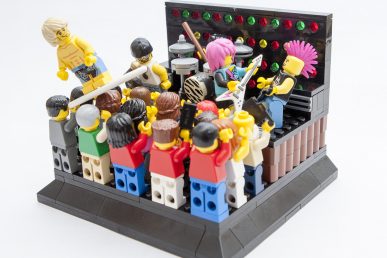In this series of interviews, we’re talking to the new Individual Directors on the 2015 OpenStack Board of Directors. These Directors provide oversight of the Foundation and its budget, strategy and goals. The 24-person Board is composed of eight Individual Directors elected by the Individual Members, eight directors elected by the Gold Members and eight directors appointed by the Platinum Members.
With over 15 years of cloud experience, Rob Hirschfeld also goes way back with OpenStack. His involvement dates to before it was officially founded and he was also one of the initial Board Members. In addition to his role as Individual Director, Hirschfeld currently chairs the DefCore committee. He’ll be speaking about DefCore at the upcoming Vancouver Summit with Alan Clark, Egle Sigler and Sean Roberts.
He talks to Superuser about the importance of patches, priorities for 2015 and why you should care about OpenStack vendors making money.
Superuser: You’ve been with the project since before it started, where do you hope it will be in five years?
In five years, I expect that nearly every line of code will have been replaced. The thing that will endure is the community governance and interaction models that we’re working out to ensure commercial collaboration.
What is something that a lot of people don’t know about OpenStack?
It was essentially a "rewrite fork" of Eucalyptus created because they would not accept patches. That’s a cautionary tale about why accepting patches is essential that should not get lost from the history books.
Any thoughts on your first steps to the priorities you laid out in your candidacy profile?
I’ve already started to get DefCore into an execution phase with additional Board and Foundation leadership joining into the effort. We’ve set a very active schedule of meetings with two sub-committees running in parallel…It’s going to be a busy spring.
You say that the company you founded, RackN, is not creating an OpenStack product. How are you connected to the community?
RackN supports OpenCrowbar which provides a physical ready state infrastructure for scale platforms like OpenStack. We are very engaged in the community from below by helping make other distributions, vendors and operators successful.
What are the next steps to creating the “commercially successful ecosystem” you mentioned in your candidacy profile? What are the biggest obstacles to this?
We have to make stability and scale a critical feature. This will mean slowing features and new projects; however, I hear a lot of frustration that OpenStack is not focused on delivering a solid base.
Without a base, the vendors cannot build profitable products. Without profits, they cannot keep funding the project. This may be radical for an open project, but I think everyone needs to care more if vendors are making money.
What are some more persistent myths about the cloud?
That the word cloud really means anything. Everyone has their own definition. Mine is "infrastructure with an API" but I’d happily tell you it’s also about process and ops.
Who are your real-life heroes?
FIRST (For Inspiration and Recognition of Science and Technology) founders Dean Kamen and Woodie Flowers. They executed a real vision about how to train for both competition and collaboration in the next generation of engineers. Their efforts in building the next generation of leaders really impact how we will should open source collaboration. That’s real innovation.
What do you hope to get out of the next summit?
First, I want to see vendors passing DefCore requirements. After that, I’d like to see the operators get more equal treatment and I’m hoping to spend more time working with them so they can create places to share knowledge.
What’s your favorite/most important OpenStack debate?
There are two. First, I think the API vs. implementation is a critical growth curve for OpenStack. We need to mature past being so implementation driven so we can have stand alone APIs.
Second, I think the “benevolent dictator” discussion is useful. Since we are never going to have one, we need a real discussion about how to define and defend project wide priorities in a meaningful way. Resolving both items is essential to our long-term viability.
Cover Photo by Michael Cory // CC BY NC
- OpenStack Homebrew Club: Meet the sausage cloud - July 31, 2019
- Building a virtuous circle with open infrastructure: Inclusive, global, adaptable - July 30, 2019
- Using Istio’s Mixer for network request caching: What’s next - July 22, 2019

)










